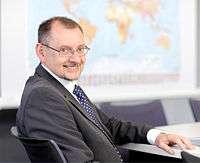Andy Harter
| Andy Harter | |
|---|---|
 | |
| Born |
5 April 1961 Yorkshire, England |
| Residence | Cambridge, Cambridgeshire, UK |
| Nationality | British |
| Fields | Computer Science, Software Engineering |
| Institutions | University of Cambridge |
| Alma mater | University of Cambridge (MA, PhD) |
| Doctoral advisor | Andy Hopper |
Andy Harter FREng CEng FIET FBCS CITP, FRSA (born 1961 in Yorkshire, England) is a British computer scientist, best known as the founder and CEO of RealVNC.
Born in Yorkshire in 1961, Harter attended the Queen Elizabeth Grammar School in Wakefield. He went on to the University of Cambridge, where he studied Mathematics and Computer Science at Fitzwilliam College[1] and Corpus Christi College. His doctoral thesis, supervised by Andy Hopper, was judged the best UK Computer Science dissertation of 1990, and was published by Cambridge University Press.[2] He subsequently became a Fellow of St Edmund's College and a Visiting Fellow at the University of Cambridge Computer Laboratory. He is probably best known for VNC, a ubiquitous remote access technology he developed in the mid 90s. He founded RealVNC in 2002 and remains its Chief Executive. In recent years he has worked on embedding the technology in Google and Intel products.[1] Under his leadership, in 2013 the company received its third Queen's Award for Enterprise[3] in three years[4] and he was named the Cambridge Businessman of the Year in 2011.[5]
In 2002 he was elected a Fellow of the IET, where he now serves as a trustee. In 2010 he was awarded the Silver Medal of the Royal Academy of Engineering[6] in recognition of an outstanding and sustained contribution to software engineering and commercialization and in 2013 he led the team that won the Academy's prestigious MacRobert Award.[7] In 2011 he was elected a Fellow of the Royal Academy of Engineering,[8] where he now serves as a trustee.[9] In 2014 he was appointed Chair of the Cambridge Network[10] and in 2015 he was awarded an Honorary Doctor of Science degree from Anglia Ruskin University.[11] In 2016 he was awarded the Faraday Medal, the most prestigious award of the IET.[12]
References
- 1 2 "Optima, Issue 17". Fitzwilliam College, Cambridge. 2011. Archived from the original on 14 May 2011. Retrieved 2011-04-30.
- ↑ "Three-Dimensional Integrated Circuit Layout". 1990.
- ↑ "The Queen's Awards for Enterprise"
- ↑ "RealVNC wins third Queen’s Award in three years"
- ↑ "Cambridge Business Excellence Awards 2011" Archived October 28, 2011, at the Wayback Machine.>
- ↑ "Top Cambridge engineer wins Academy Silver Medal"
- ↑ "Software company RealVNC wins UK's premier engineering prize"
- ↑ "Academy celebrates a new President and 59 new Fellows"
- ↑ "Trustee Board - Royal Academy of Engineering"
- ↑ "Cambridge Network welcomes Andy Harter as new Chair"
- ↑ "Internationally renowned engineer is made a Doctor of Science"
- ↑ "Dr Andy Harter awarded the prestigious IET Faraday Medal